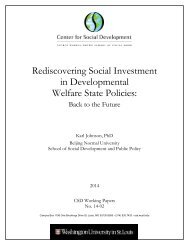Exploring and Assessing Intercultural Competence - Center for ...
Exploring and Assessing Intercultural Competence - Center for ...
Exploring and Assessing Intercultural Competence - Center for ...
Create successful ePaper yourself
Turn your PDF publications into a flip-book with our unique Google optimized e-Paper software.
<strong>Exploring</strong> <strong>and</strong> <strong>Assessing</strong> <strong>Intercultural</strong> <strong>Competence</strong><br />
The numbers of individuals who completed <strong>and</strong> returned survey <strong>for</strong>ms were as follows:<br />
British Alumni Responses 8 of 22 (+5 interviews)<br />
Swiss Alumni Responses 20 of 76 (+1 interview)<br />
Volunteers (at beginning) 3 of 5<br />
Volunteers (at end) 5 of 5 (+2 interviews)<br />
Mentors (of Volunteers) (at beginning) 4 of 5<br />
Mentors (of Volunteers) (at end) 3 of 5 (+4 interviews)<br />
Mentors (Self) (at beginning) 3 of 5<br />
Mentors (Self) (at end) 4 of 5 (+4 interviews)<br />
Interestingly, in the case of Great Britain, completed responses were received from 100% of all<br />
participants who actually received survey <strong>for</strong>ms. The difference between the numbers anticipated<br />
<strong>and</strong> those who responded was due entirely to an inability of the cooperating office to reach<br />
potential respondents due to faulty addresses, or a lack of <strong>for</strong>warding addresses. In Switzerl<strong>and</strong>,<br />
the reason is less clear given the un<strong>for</strong>tunate loss of our research assistant (RA) midway through<br />
the project <strong>and</strong> their inability to fulfill their commitment with <strong>for</strong>ms <strong>and</strong> interviews.<br />
Given these situations, we lowered the quota <strong>for</strong> RAs in each country to interview only 5<br />
respondents (instead of the original 9). Great Britain came through with the 5 prerequisite<br />
interview reports, Ecuador with 5 <strong>for</strong> mentors <strong>and</strong> 5 <strong>for</strong> volunteers, but unhappily, (due to internal<br />
administrative difficulties), Switzerl<strong>and</strong> turned in only one interview report of the expected 5,<br />
severely affecting our access to the anticipated quantitative data.<br />
6. Research Approach<br />
This Initial Phase Project was undertaken in several stages. To review: first, an update of our<br />
existing literature review <strong>and</strong> refinement of our conceptualization of intercultural competence,<br />
plus a search <strong>for</strong> <strong>and</strong> analysis of additional recently developed instruments <strong>and</strong> relevant research<br />
projects focusing on civic service. The revised instrument was then organized into a series of<br />
scales representing a coherent universe of content with items arranged hierarchically to reflect<br />
increasingly deeper involvement. In one scale designed to assess language, <strong>for</strong> example, the items<br />
reflect varying degrees of language use. The scales were developed in this manner to produce<br />
reliable measures of constructs with relatively few items per scale (cf. Appendix G: The Survey<br />
Form). Even so, the resulting instrument was lengthy <strong>and</strong> posed a challenge <strong>for</strong> potential<br />
respondents. Although keenly aware of this, we decided to incorporate all items that best address<br />
the multiple dimensions of ICC in this initial attempt <strong>and</strong> subsequently per<strong>for</strong>m an item analysis<br />
to identify the most reliable items to include in a shorter <strong>for</strong>m <strong>for</strong> the follow-on project.<br />
The instrument, as initially constituted, was refined by administering it first to a small number of<br />
current <strong>and</strong> past participants, followed by discussion of their reactions. Once this stage was<br />
completed, the questionnaire was finalized <strong>for</strong> the study <strong>and</strong> sent to RAs to translate into German<br />
<strong>and</strong> Spanish (<strong>for</strong> use in Switzerl<strong>and</strong> <strong>and</strong> Ecuador), <strong>and</strong> adapted into British English (<strong>for</strong> use in<br />
Great Britain <strong>and</strong> Ecuador). Translated <strong>for</strong>ms were then translated back into (American) English<br />
to provide a two-way check on accuracy, corrected as needed, <strong>and</strong> final versions were distributed<br />
by respective RAs to current <strong>and</strong> past participants (cf. Appendix G. <strong>for</strong> a sample of the original<br />
version of the survey <strong>for</strong>m in American English). We considered it imperative that recipients be<br />
able to complete the survey in their native languages. Questionnaires were sent via email where<br />
possible or regular mail, as necessary. Available respondents were then interviewed face-to-face<br />
or by telephone to obtain additional in<strong>for</strong>mation.<br />
<strong>Center</strong> <strong>for</strong> Social Development<br />
Washington University in St. Louis<br />
14
















